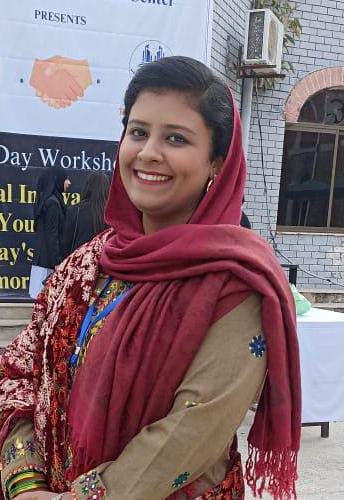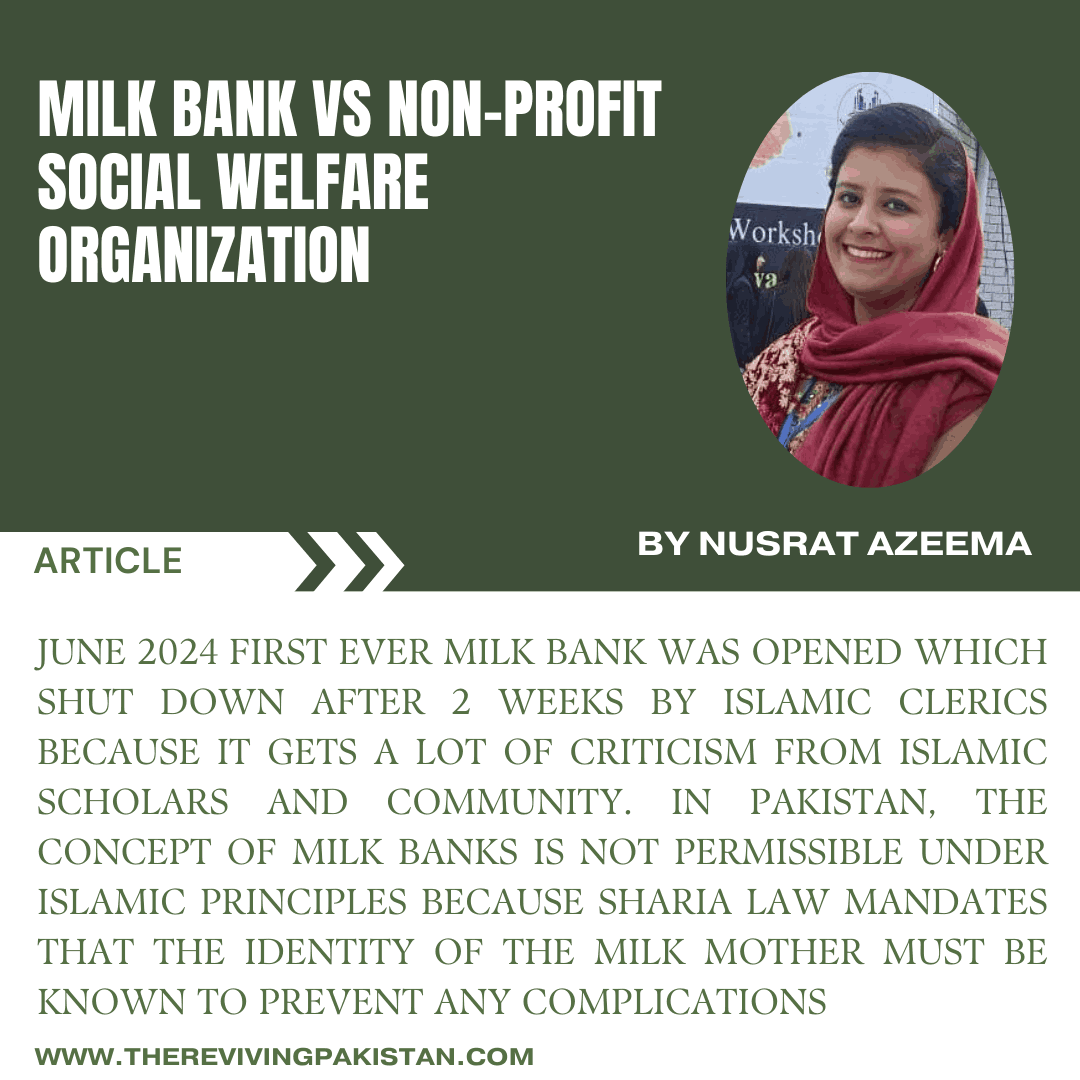About the Author(s)

Nusrat Azeema
Author is an academic and researcher with a strong foundation in Mass Communication, having completed her MPhil in the field. Her research interests focus on the intersection of communication strategies and social development, with a particular emphasis on early childhood development.
June 2024 first ever milk bank was opened which shut down after 2 weeks by Islamic clerics because it gets a lot of criticism from Islamic scholars and community. In Pakistan, the concept of milk banks is not permissible under Islamic principles because Sharia law mandates that the identity of the milk mother must be known to prevent any complications related to milk kinship. However, there is still a need for accessible, safe, and ethically appropriate breast milk for infants, particularly for those who are orphaned, abandoned, or whose mothers are unable to breastfeed due to medical reasons.
The phenomenon of human milk exchange among women has been progressively earning significant attention. Milk sharing is the act of a donor providing expressed breast milk directly to a recipient family for the specific purpose of nourishing a newborn or breastfeeding a recipient infant. Prophet Muhammad (S.A.W) . was breastfed by three ladies throughout his crucial early years till he was four years old. The ladies in question are: i) Thuwayba, who served as a slave under Abu Lahab; ii) Halimatus Saadiah, hailing from the Saa’d family; and iii) Ummu Ayman, who eventually became a slave of Prophet Muhammad (S.A.W). Milk sharing among Muslims fosters a strong link and enhanced responsibility, as it is believed that distributing milk from one woman to other results in the creation of fresh milk. Kinship referred to as “Rada” or “Milk-Suckling” Mahram. When a woman assumes the role of a wet nurse, she Motherhood is assumed by the child, and all matters pertaining to blood mahrams are applicable in this context. parents, siblings, cousins, aunts, uncles, and so forth. According to historical accounts, our Prophet Muhammad Even when Prophet Muhammad (S.A.W) married Siti Khadijah and immigrated to Medina, he remained committed and actively supported all of his rada moms until they all died.
Allah mentioned in the Quran about the concept of mahram which Allah say: “Forbidden to you (are) your mothers and your daughters and your sisters and your father’s sisters and your mother’s sisters and daughters (of) brothers, and daughters (of) sisters and (the) mothers who nursed you and your sisters from the nursing and mothers (of) your wives and your step daughters who (are) in your guardianship of your women whom you had relations with them, but if not you had relations with them, then (there is) no sin on you. And wives (of) your sons, those who (are) from your loins and that you gather together (between) two sisters except what has passed before. Indeed, Allah is Oft-Forgiving, Most-Merciful” [An-Nisa 4:23]. The milk kinship and rada mahram concept as Prophet Muhammad p.b.u.h. said: “What is haram (forbidden) through birth is haram through breastfeeding”. If a child receives breast milk from a relative before the age of two and the quantity is enough to fill the stomach and develop the child’s muscles and bones, then the infant is considered to be milk kin. Religious experts from various schools of thought have differing interpretations of the prerequisites and formation of milk kinship. Abu Hanifa states that a mother is considered a wet nurse if she continues to breastfeed her child for more than thirty months after birth. This is in line with the view held by Imam Muhammad and Imam Abu Yusuf, who both said that a mother who has breastfed for at least two years is considered a wet nurse. But kinship through breastfeeding doesn’t happen after the first feeding; it takes at least five feedings by the same mother, say Imam Shafii and Imam Hanbali. Milk kinship is established when breast milk reaches the infant’s stomach and builds flesh and bone, according to the majority of experts, despite differing opinions in different schools of thought. As a result of breastfeeding, a bond is formed between the infant and the wet nurse, as well as between the infant and the wet nurse’s mahram family and other breastfed infants. A small quantity of milk passing through the digestive tract is sufficient to establish familial ties. To avoid the mahram (forbidden marriage) that results from milk kinship, it is crucial to learn the identities of those involved in the sharing of milk according to Islamic belief (Nazri & Muda, 2020).
According to my opinion to create registered milk donation centers in collaboration with the Edhi Foundation or any welfare trust centers, where women already voluntarily donate breast milk while they received any infant from garbage etc and these female identities are fully registered and recorded. This would ensure compliance with Islamic law, providing a secure source of nourishment for infants in need. Islamic principles discourage the use of anonymous milk banks due to the requirement of knowing the donor’s identity. By registering each milk donor, we can ensure that the religious aspects are respected, and milk kinship regulations are followed. Many infants in Pakistan, particularly those in orphanages or shelters, are in dire need of breast milk, which is a better alternative to formula milk in terms of nutrition and immunity. This system would create job opportunities for women in need by employing them as donors in a structured, formal environment where they are fairly compensated. The Edhi Foundation type organization already a respected organization for orphaned children and women’s welfare, could play a vital role in managing and operating these centers.
Partner with the Edhi Foundation, where women who have already been registered as milk donors in infant shelters can expand their services through the milk donation centers. Set up milk donation centers where women can donate breast milk under fully registered systems, ensuring that the identity of both the donor and recipient is known. Employ women as donors or workers within these centers, offering a stable source of income. This initiative would also provide proper training on hygiene and breastfeeding practices. Launch a public awareness campaign in collaboration with religious scholars to educate the public on the Islamic rulings of milk kinship and the importance of safe, registered milk donation for infant health. Distribute the collected and registered milk to infants in shelter homes or orphanages, where they have limited access to proper breastfeeding.
By establishing registered milk donation centers in collaboration with the Edhi Foundation and other organization, Pakistan can address the dual challenge of supporting infants in need while adhering to Islamic principles. This initiative would not only provide essential nutrition for vulnerable children but also offer dignified employment to women, fostering a culture of care and community welfare.

